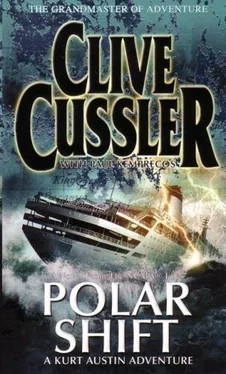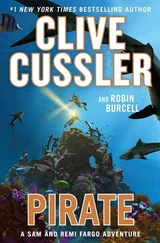He waited a minute, then went over to one room. Holding the pistol behind his back, he glanced up and down the hallway to make sure he was alone, then knocked. The door opened a moment later. The man scowled when he saw Schroeder standing there. It was the man he had jostled. He had taken off his jacket, and, as Schroeder had suspected, he was wearing a shoulder holster with a handgun in it.
"What the hell do you want?"
"I seem to have lost my room key. I was wondering if I could use your phone."
"I'm busy." He put his hand on the holster. "Go bother someone else."
The man started to close the door. Schroeder quickly brought the pistol around and snapped off a shot between the eyes. The man crumpled to the floor with a look of abject surprise on his otherwise unmarked face. Glancing up and down the corridor, Schroeder stepped over the body and dragged it just inside the room.
Schroeder followed the same routine, with slight variations but similar results. In one case, he rushed his first shot and had to fire twice. In another, he heard the elevator door open just as he pulled the body into the room. But when it was over, he had killed four men in less than five minutes.
He felt no remorse, dispatching them with the cold, murderous efficiency of his old days. They were simply violent thugs, no different from many he had encountered, even worked with. Worse, they were sloppy and careless. The team must have been assembled in a hurry. They were not the first men he had killed. Nor were they likely the last.
He hung do not disturb signs on each door. A few minutes later, he was back in his rental car headed for the airport. Harper was still in his office, burrowing through his paperwork like an overgrown mole.
"I talked to the TV crew," Schroeder said. "They've changed their minds. They've decided to head down to Kodiak Island to shoot a feature on bears."
"Shit! Why didn't they tell me?"
"You can call them and ask. But they were on their way out when I called them."
Harper snatched up the phone and called the hotel. He asked to be connected to the TV crew's rooms. When no one answered, he slammed the phone down on its cradle. He rubbed his eyes, and seemed on the verge of breaking into tears.
"That's it," he said. "I was counting on a check from this run to make the monthly payment on the big bird. I'm ruined."
"You don't have any other charters scheduled?"
"It's not that easy. It takes days, sometimes weeks, to put together a deal."
"Then the plane and boat are free for charter?"
"Yeah, they're free. You know anyone interested in chartering them?"
"As a matter of fact, I do." Schroeder reached into his jacket pocket and pulled out a thick packet of bills, which he tossed onto a pile of papers. "This is for the trip out and the boat. I'll pay you an equal amount for the return flight. My only condition is that you stand by for a few days until I'm ready to leave."
Harper picked the packet up and riffled the edges. They were all hundred-dollar bills. "I can practically buy a new plane for this." He frowned. "This isn't something illegal, is it?"
"Nothing illegal at all. You'll be carrying no cargo. Only me."
"You got papers?"
"Passport and visa are all up-to-date and in order." They should be, for the money he paid for them, Schroeder thought. He had stopped in Seattle and waited impatiently while his favorite ID forger had cooked up a set of papers for Professor Kurtz.
Harper extended his hand. "You've got yourself a deal."
"Good. When can we leave?"
"Any time you're ready."
"I'm ready."
The plane took off an hour later. Schroeder sat back in his seat, enjoying the solitude that came from being the only passenger on the plane, and sipped on a glass of Scotch that Harper had thoughtfully provided. Harper was at the controls. As Fairbanks faded in the distance and the plane struck off toward the west, he took a deep breath. He was aware that he was an old man trying to do a young man's job. Schroeder had asked not to be bothered for a while. He was tired and needed some sleep.
He would need deadly clarity for the task ahead. He cleared his mind of all emotion and closed his eyes.
The NOAA ship Benjamin Franklin limped along like a sailor who'd been in a bar brawl. The tug-of-war with the whirlpool had taken its toll on the ship's engines, which had to be babied so they wouldn't break down completely. The Throckmorton trailed several hundred yards behind in case the NOAA vessel ran into trouble.
As the two ships slowly made their way toward Norfolk, a turquoise-colored utility helicopter with the letters NUMA visible on the fuselage appeared in the western sky. It hovered over the Benjamin Franklin like a hummingbird before touching down on the deck. Four people scrambled out, carrying medical supplies and equipment.
Crewmen directed the medical team to the ship's sick bay. None of the injuries sustained when the ship nearly went vertical in the whirlpool were life-threatening. The captain had requested the team to help the ship's paramedic, who had been overwhelmed with the sheer volume of bruises and concussions.
The helicopter was refueled, and two crewmen who had suffered broken arms were loaded aboard. Austin thanked the captain for his hospitality. Then he, along with the Trouts, Zavala and Professor Adler, climbed into the helicopter. Minutes later, they were airborne.
The helicopter touched down at National Airport less than two hours later. The injured were unloaded into waiting ambulances. The Trouts caught a taxi to their Georgetown town house, taking Adler with them as their guest, and Zavala drove Austin to his house on the Potomac River in Fairfax, Virginia, less than a mile from the Central Intelligence Agency headquarters in Langley. They all agreed to meet at eight the next morning after a good night's rest.
Austin lived in a converted Victorian boathouse overlooking the river. He had acquired the turreted building when he worked for the CIA. The mansard-roofed structure was part of an old estate, and the previous owners had let it run down. It had become a waterfront condominium for countless families of mice by the time Austin gutted and redid the interior and restored the exterior to its former glory. The space under the living quarters housed his racing scull and small, outboard hydroplane.
He dropped his bag in the hall and walked into a spacious living room. His house was an eclectic combination of the old and the new. The authentic, dark wooden, colonial furniture contrasted with the whitewashed walls hung with contemporary originals and painterly primitives and charts. Floor-to-ceiling bookcases held the leather-bound sea adventures of Conrad and Melville and the well-worn volumes of the great philosophers he liked to study. Glass cases displayed some of the rare dueling pistols he collected. His extensive collection of music, with a preference for progressive jazz, mirrored his steely coolness, his energy and drive, and his talent for improvisation.
He checked his phone for messages. There was a pile of calls, but nothing that couldn't wait. He flicked the stereo on, and Oscar Peterson's frenetic piano fingering filled the room. He poured a drink for himself of his best aniejo tequila, opened the sliding glass door and went out onto the deck with the ice tinkling pleasantly in his glass. He listened to the soft, rippling sounds, and breathed into his lungs the misty, flower-scented river air that was so different from the briny scent of the ocean where he spent much of his working days.
After a few minutes, he went back into the house, pulled a book on ancient Greek philosophers from a shelf and opened it to Plato's "Allegory of the Cave." In Plato's parable, prisoners chained in a cave can see only the shadows cast by puppets on the wall and can hear the puppeteers moving behind their backs. On that slim evidence, the prisoners must decide what is shadow and what is reality. Similarly, Austin's brain was sorting the strange events of the last few days, trying to impose order on his mental chaos. He kept coming back to the one thing he could grasp. The mysterious ship.
Читать дальше












